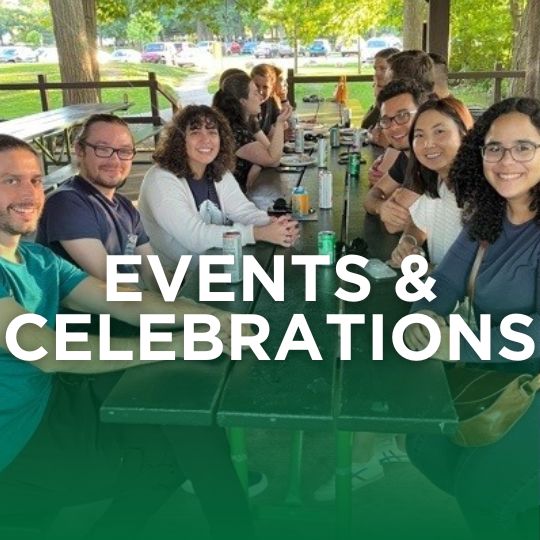Diversity
The Clinical Science Area at MSU is committed to understanding and promoting mental health in an increasingly diverse society. To train our students as culturally responsive clinical scientists, we have integrated a Cultural Responsivity approach (defined below) into our coursework, research, and clinical training.
The definition of Cultural Responsivity we have developed for our program comprised of the following elements:
- Active integration of ethnocultural, racial, and intersectional responsiveness
- Attention to issues of systemic power and privilege
Our specific goals for our students are for them to develop the following skills: (1) recognition of cultural variation in causes and expression of mental illness and psychopathology, and (2) the ability to interact successfully as a professional with individuals from diverse backgrounds; as well as the elements articulated above (i.e., a-b) in research and clinical training.
Faculty research on diversity, equity, and inclusion issues, as well as relevant area activities, are described on individual faculty websites. Below, we highlight program policy and position statements. All of our program position statements are reviewed regularly by Clinical Science Area program members to ensure that they reflect current state-of-the-science and clinical and ethical practice. Please note that these activities described below are not exhaustive, as many didactics and training activities are included in our coursework and practica as well.-
Policies Related to Training Clinical Scientists to Serve a Diverse Public
Our program faculty, students, and staff are united in our commitment to uphold the aspirations articulated in the APA Multicultural Guidelines: “To recognize and understand that as cultural beings, psychologists hold attitudes and beliefs that can influence their perceptions of and interactions with others as well as their clinical and empirical conceptualizations. As such, psychologists strive to move beyond conceptualizations rooted in categorical assumptions, biases, and/or formulations based on limited knowledge about individuals and communities” (APA, 2017). We further recognize that psychological science, including clinical science, has historically excluded the perspectives of those with less power, privilege, and status, which may create personal and professional “blind spots” for working with individuals from diverse backgrounds. Therefore, our training ensures that graduate students are provided the opportunity to develop the knowledge, skills, and attitudes to work effectively with all members of the public. We believe the provision of an equitable, supportive, and inclusive environment for all clients, faculty, students, and staff is foundational to our training mission.
In support of our mission, our program provides opportunities for students to examine how their own attitudes, beliefs, and values may affect their professional competencies in treating members of the public. Because integrating personal beliefs and values with professional competence is a developmental process, supervisors work together with students to identify instances when it may not be in the client’s and student’s best interest to work together. Ultimately, however, students cannot choose to avoid working with specific client populations or refuse to develop professional competencies solely on the basis of the students’ attitudes, beliefs, or values, and students may be assigned to treat clients who challenge their perspectives, experiences, or beliefs. In these instances, we support students in finding a belief- or value-congruent path that allows them to work in a professionally competent manner with such clients. Failure to meet levels of competence set forth for serving a diverse public are addressed like other instances in which professional core competencies are not met.
Adapted, with permission, from the statement written by Pennsylvania State University's Clinical Area Equity Committee.
-
Position Statement on Rapid Onset Gender Dysphoria (ROGD)
Authored by members of the Clinical Science Area Program
9.25.2024
The opinions expressed here are the views of the faculty of the Clinical Science Area and do not necessarily reflect the views and opinions of Michigan State University.
The MSU Clinical Science Area, as a program, is committed to respecting the individuality, autonomy, and authenticity of all transgender and gender diverse people. We acknowledge the ways that psychology has harmed this community, such as the historical ways that the Diagnostic and Statistical Manual of Mental Disorders (DSM) of the American Psychiatric Association upheld stigmatizing views that conflated gender identity with mental illness.1,2 This influence still lingers today as the DSM is used by some as a reason to deny rights and protections to transgender and gender diverse people.1-4 . The lives, experiences, and identities of transgender and gender diverse people should never be subjected to debate.
We join the Coalition for the Advancement and Application of Psychological Science (CAAPS) in standing against ROGD (see https://drive.google.com/file/d/124WFEKjeDSRggi4-5mxgQle7SWXUoybs/view?usp=sharing), and we thank Dr. NiCole Buchanan (MSU Psychology faculty member and author of the position statement) and CAAPS for their leadership in developing this important statement. ROGD is not a diagnosis in the DSM 5th Edition or the International Classification of Disease 11th Revision, and there is no reputable scientific evidence supporting the concept.5,6 Thus, promoting ROGD is directly counter to clinical psychological science and its foundations in empiricism.
Accordingly, the MSU Clinical Science Area will not support training that promotes ROGD principles. We encourage our faculty and students to combat anti-trans rhetoric, policies, and harmful practices and to promote trans-affirming psychological practice across clinical psychological science.
References
- Ashley, F. (2019). The misuse of gender dysphoria: Toward greater conceptual clarity in transgender health. Perspectives on Psychological Science, 1, 1-6. DOI:10.1177/174569161987298.
- dickey, l. m. (2020). History of gender identity and mental health. In E. Rothblum (Ed.), The Oxford Handbook of Sexual and Gender Minority Mental Health (pp. 25-32). Oxford University Press.
- Puckett, J. (2019). An ecological approach to therapy with gender minorities: Special issue commentary. Cognitive and Behavioral Practice, 26, 254-269. https://doi.org/10.1016/j.cbpra.2019.08.002
- Winters, K., & Ehrbar, R. D. (2010). Beyond conundrum: Strategies for diagnostic harm reduction. Journal of Gay & Lesbian Mental Health, 14, 130-138. DOI: 10.1080/19359701003609922
- Restar, A. J. (2020). Methodological critique of Littman’s (2018) parental-respondents accounts of “rapid onset gender dysphoria.” Archives of Sexual Behavior, 49, 61-66. https://doi.org/10.1007/s10508-019-1453-2
-
Diversity Science Committee
The Diversity Science Committee (DSC) is open to all faculty and students in the CSA, and involves regular meetings for students and faculty in the program who wish to engage in structured discussions and projects related to diversity and social justice. In terms of process goals, we provide a collaborative space to explore, understand, and enact understandings related to diversity and systems of power and privilege, and the promotion of cultural responsivity with the ultimate goal of creating inclusive excellence in our program.
In terms of project goals, we create initiatives and explore opportunities to engage our Department and the broader community in achieving inclusivity goals, and collaborate with the Clinical group and the Department to enhance policies and procedures related to issues of inclusivity and cultural responsivity. We also forged a connection with Haven House (https://www.havenhouseel.org/) to serve families facing homelessness in the greater Lansing area. In the 2023-2024 school year, we developed and gave a presentation on caregiver stress to organizations in the community (i.e., Gilda’s Club of Grand Rapids and the Mid-Michigan Autism Association) and sought to better address the program climate by revamping our Brown Bag series to include a strong interdisciplinary focus on one inclusion-related issue each school year. This is being implemented in the 2024-2025 school year, with 7 of our 14 brown bags focusing specifically on the measurement and consequences of poverty.
The DSC also frequently invites outside speakers to present to the program on advocacy and diversity-related research topics. In the past few years, we have focused on issues of race and racism, socioeconomic status, health disparities, sexual orientation, gender identity, and disabilities as they relate to the training of clinical scientists and the research, treatment, and assessment of psychological disorders.
Some example activities include:
- Organized a semester-long series of presentations and workshops on anti-Black racism, including presentations by each research lab on the history of anti-Black racism in their field as well as outside speakers.
- Brown bag presentations by individuals with lived experience of severe mental illness
- Group discussions among research labs to identify ways of conducting culturally responsive research with existing datasets or resources within each lab.
- Organized a supply drive for a local shelter
-
Admissions Interview Day Diversity and Student Life Panel
Our program hosts a Diversity and Student Life panel discussion during our Graduate Admissions Interview Day.
Graduate students organize and facilitate the panel discussion about diversity in our clinical program, at MSU, and in the surrounding community. Applicants are encouraged to ask questions about diversity and inclusion issues (e.g., “What is the climate for Asian students in this program?”, “Are there sufficient numbers of Black individuals in the local community to conduct my research on depression with this population?”, “Are there opportunities to conduct therapy with Spanish-speaking clients in the clinic?”). The panel also addresses general questions about life in graduate school (e.g., "What is a typical day for a graduate student in this program?", "What is the work-life balance like?", "What are some fun activities to do around the East Lansing area?").





